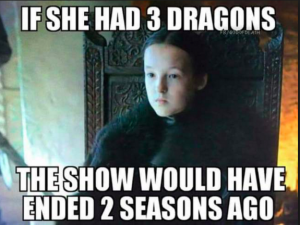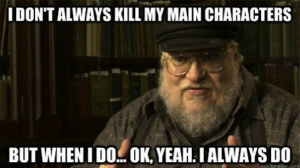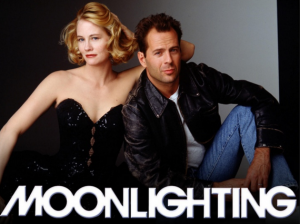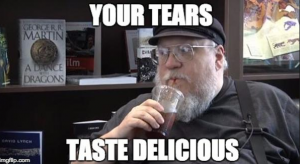
Just finished watching Season 7 of Game of Thrones and, of course, now I’m in the post-GoT depression. I will have to wait who knows how long to GET ANSWERS! I NEED JUSTICE! WHAT IS GOING TO HAPPEN?
AAAHHHHHH!
Though I do feel slightly robbed that any television season would be legally permitted to only have seven episodes, I must take the good with the bad. Thus, today I want to talk about what writers like George R.R. Martin do so freaking well and why the rest of us would be wise to pay attention and learn.
Even if you’ve never read or watched GoT, odds are you’ve probably read a book or watched a TV series that had your nerves wound so tightly you physically couldn’t stand the tension. I know there were times watching GoT that I literally had to get Hubby to pause so I could breathe, take Pippa outside for a moment and gather myself. Brace for more.

These are the kinds of stories that drive us mad, the times when Prudent Self will tiptoe up and whisper in our ear, “Hey, um it’s almost three in the morning and you need to be up for work in a couple hours.” And, though we know she’s wise, we will then threaten to water-board Prudent Self if she doesn’t go away and leave us alone.
We’ve all done it. We promised we’d go to bed at the end of the chapter, end of the episode, whatever. But, deep down, we knew we were a dirty rotten liar who had zero intention of stopping until we had some semblance of peace.
Problem is, if a writer is great? Peace will not come without a price. It will not come easily. Great writers will never give the audience what they want…until it is time to.
Think of Christmas

Yes, I know I will probably be the only blogger ever to slot Christmas in same post as GoT but work with me.
For those who celebrate Christmas or some version of the holiday, think back to when you were a kid. Why was Christmas such a big deal? Because it was ONE day out of 365.
ONE.
***And frankly this is why we get pissy with Christmas stuff out in July because retailers are wrecking the “specialness” of it.
Oh there was a whole holiday season and we sang songs and nagged Mom to hurry with the grocery shopping because Frosty the Snowman was going to be on NBC at 7 and if we missed it? We had to wait a WHOLE year to see it again.
As kids we helped bake cookies and were allowed to maybe even eat some. We watched specials (that really were special because if we missed them, tough luck and see you next year, Kid). Though there was all this other revelry (parties, candy canes, pies) there….over there in the corner was a tree with shiny boxes of glorious mystery beneath it.
For those reading this post who are mere mortals like me, you likely had a year that you got the bright idea to peek. Maybe you eased open tape with the skill of Little Finger. Or perhaps you unearthed the stash of gifts hidden in the master closet before your parent(s) could wrap them.
In the beginning, for me, it seemed like the precise thing I wanted but in the end? All I did was spoil the singular day of surprise and joy. I got what I thought I wanted and, frankly? It sucked. Christmas morning wasn’t nearly as bright.

Back to Fiction
There is a lot to be said for delayed gratification. When we allow the audience so, so close they can almost taste what they want…then we snatch it away and say, “Uh uh *wags finger* you need to wait.” THAT is being a master storyteller. And the audience will hate and love us all in the same expanse of time.
Too often we are too easy on our readers. They beg to see what’s under the tree so instead of standing firm, we relent and give them A gift and let them unwrap it and reveal the mystery. Problem is, with every mystery we reveal, we diminish the KAPOW at the end.
What are some common ways we diminish the mystery and inadvertently wreck our own story?
Misused Flashbacks

No. No we don’t.
Flashbacks are a literary device and are excellent when used properly. Problem is? More often than not, they’re simply there to explain. Perhaps we are writing a scene and feel ourselves tense up. Well, it is human nature to alleviate tension.
We feel tense, so we insert a flashback to explain why Such-and-Such is a certain way or is making a certain decision and we feel better. But, if you press your ear to your computer and listen closely? You can hear all the gut-wrenching tension leave your story like air from a balloon (and yes it is making a farting sound 😛 ).
Resist the Urge to Explain

Mr. Darcy has left generations of women swooning because Jane Austen just let Darcy be Darcy. She resisted the urge to unseal his therapy files for us to see. Oh there were hints and dribbles here and there but she left lots and lots of blank space for us to fill in the missing slices and that made Darcy all the more desirable.
When we explain with characters or story we wreck tension.
I have a saying:
The Force was better before it was explained.
Metachlorians? FRIGGING REALLY? The Force didn’t need explaining. We (audiences) accepted The Force. It was *sputters*…THE FORCE. It was mystical and magical and then…. *farting sound*. More on that here in What Went Wrong with the Star Wars Prequels?
Metachlorians.

The same thing happened to one of the greatest villains (or anti-heroes) of the 20th century—Hannibal Lecter. Hannibal was already fascinating. We honestly didn’t need to go back in time and witness his childhood how and why he started snacking on people. The prequel movie Hannibal Rising bombed because it never needed to exist in the first place. We didn’t need to know WHY.
We wanted to, but just because we want something doesn’t mean it’s good for us. Telling us HOW Hannibal came to be a psychopath did nothing to make him a stronger character.
In fact, it did precisely the opposite. #YouveBeenMetachlorianed
Showing Your Hand Too Soon

Tonight I am teaching a class More than Gore for those who desire to write horror, though what I will teach in this class is actually highly useful for all genres.
Horror, in my POV, is one of the most challenging genres to write simply because we have a jaded audience that is tough to rattle. We no longer have access to the low hanging fruit (blood, guts, two-headed monsters) because they are tedious tropes that don’t even faze a modern six-year-old.
In horror, the fastest way to ruin the story is to reveal the monster too soon. Stephen King in Danse Macabre talks about this phenomenon, and why so often the ending of horror stories are such a letdown.
It is because of HOW the human mind works. When our imagination is left to run amok, we are terrified because what we are facing is UNKNOWN.
Once it the UNKNOWN becomes KNOWN, the audience lets out a collective scream of terror…and relief. See, if we are creeping up the stairs and something is bashing against a giant door with such force the hinges are loosening, our imaginations run wild. It’s terrifying.

The second we open the door and see the fifty-foot bug? We yell out, but our brains instantly go, “Whew! Okay a fifty-foot bug. I can deal with that. Thank GOD it wasn’t a hundred foot bug.”
If it was a hundred foot bug, brain would scream then go, “Thank goodness it wasn’t a thousand foot bug.” Y’all get the gist. Once we have the reveal? The tension instantly bleeds away. Thus, knowing this, we need to become excellent secret-keepers. Delay the gratification.
While some of y’all might believe this only holds for horror? Untrue. One word for the older folks… Moonlighting.

Audiences were riveted, dying for Dave and Maddie to get together. The show won all kinds of Emmys, broke records, and audiences were riveted until Episode 14 of Season 3 when their relationship finally was consummated. Though the show continued for a total of five seasons, that singular episode toward the end of Season 3 marked the decline in viewership.
Of course it did!
The audience had unwrapped the “gifts” and all that remained were leftovers and turkey sandwiches.
Beware of Low-Hanging Fruit

I’ve read romances where, by chapter four we know through POV that both guy and gal are mad for each other and the only thing keeping them from making out like teenagers on prom night are bad situations and inconvenient interruptions.
I’ve read other genres where the MC has more divine intervention than the Book of Acts. Journals, dreams, visions, letters, and plot puppets who conveniently appear and who have zero purpose for existing beyond babysitting the MC out of a mess.
Readers want the easy way, but they really don’t. It’s why I love Game of Thrones. I just about think the story is going to go one way then WHAMMO….George kills a character I love or tosses them under a pile of ice zombies, or throws them in prison or whatever. George R.R. Martin is a horrible sadistic, cruel, emotionless, psychopathic—sigh—genius storyteller.
In the end, remember the heart of fiction is the struggle. Build the anticipation and crush the urge to give over your mysteries too soon or too easily. The harder it is for audiences to get that satisfaction they so desire? THE BETTER.
What are your thoughts? What other shows can you think of that were awesome until the writer(s) made it too easy or gave up the mystery too soon? What shows make you CRAZY because you just can’t seem to get what you want? What books kept you up all night? What characters resonate with you because there is STILL mystery to them? They weren’t ever fully “explained.”
And yes this is likely the first blog to use GoT, Christmas, Moonlighting, Hannibal Lecter AND Star Wars 😛 . But I really hope it helps up your storytelling skills.
I love hearing from you!
For the month of September, for everyone who leaves a comment, I will put your name in a hat. If you comment and link back to my blog on your blog, you get your name in the hat twice. What do you win? The unvarnished truth from yours truly. I will pick a winner once a month and it will be a critique of the first 20 pages of your novel, or your query letter, or your synopsis (5 pages or less).
Still time to sign up for tonight, and remember a FREE recording is included with purchase!
 Instructor: Kristen Lamb
Instructor: Kristen Lamb
Price: $35.00 USD
Where: W.A.N.A. Digital Classroom
When: TUESDAY, September 5, 2017. 7:00-9:00 p.m. EST
Humans have always been fascinated with what scares them which is why horror fiction is a staple genre. It is also, quite possibly, the most challenging genre to write. Giant bugs and chainsaws just don’t get the screams they used to.
Blood, guts, gore and shock factor are low-hanging fruit (and always have been) and worse than that? They simply don’t have the impact they used to.
Audiences are too desensitized. This means we need to work harder to dig in and poke at what REALLY frightens/disturbs people.
Though this genre is extremely challenging to write well, there is an upside. The horror genre lends itself well to the short form (novellas and short stories).
Believe it or not, some of our staple horror movies–and the BEST horror movies—were actually adaptations of short stories and novellas (1408 by Stephen King and Hellbound Heart by Clive Barker being two examples).
Meaning, if you want to go Hollywood? Hollywood loooooves horror.
In this class we will cover:
- The science behind fear and why people crave it. Why fear is even healthy!
- Psychology of fear, thus how to locate the pain points.
- Why audiences are craving MORE horror (Yes, this actually does go in cycles).
- The different types of horror fiction.
- The importance of character in horror.
- How horror can actually resonate much like literary fiction.
- How to generate page-turning tension that will leave readers with a story they can’t stop thinking about…and that might even give them nightmares.
NEW CLASSES FOR SEPTEMBER AND MORE!
All classes come with a FREE recording!
We’ve added in classes on erotica/high heat romance, fantasy, how to write strong female characters and MORE! Classes with me, with USA Today Best-Selling Author Cait Reynolds, award-winning author and journalist Lisa-Hall Wilson, and Kim Alexander, former host of Sirius XM’s Book Radio. So click on a tile and sign up!
[abcf-grid-gallery-custom-links id=”22482″]








30 comments
5 pings
Skip to comment form
Excellent! Lately there have been a lot of books I’ve read where I felt the author rushed to tell the story. I prefer the books that take longer to tell and leave something to the imagination.
I remember Moonlighting, and they did the exact same thing with Castle, then tried to fix it with amnesia – shades of daytime soaps. Great blog. Glad to have you back and safely unsoggy.
Great points and entertainingly presented. I will never regret subscribing to your blog. Keep it up!
You’re spot on about not revealing secrets too soon. But if secrets are going to be hidden until the end then the end had better be worth the wait. Take Stephen King; he’s great at building tension, but his endings suck. Look up ant-climactic and there’s a photo of all of his books. Except for “The Stand.” That’s the only ending I liked, when The Walkin’ Dude washed up in that undiscovered island and encountered the natives who never knew the rest of the world existed. Very cool. All his other books I’ve thrown against the wall. I don’t even read him anymore. (Not just because of his books, but reasons ?) The ending has to be worth the reader’s tension.
Dang. Sorry about all the fat fingered spelling errors. I should NOT be allowed to type on a phone!
Thanks so much for this post, Kristen. It’s what I’ve been agonizing with in my own work. It’s like seeing the steep learning curve before me with each paragraph. I’ll write 70 to 120 words, read it, and think: IT’S TOO LOVELY! BARF! NO POWER!
I go back and start again. The next edit is essentially the same, but with a few red sprinkles added. Grrr. Even the third time is far from the charm. This goes on and on, because I still tend toward what feels good. By the time I finally get a breakthrough, I’m temporarily satisfied, maybe pleased, but it’s still a long way to the end. This book could kill me if I live that long.
I’m reading Laurell K Hamilton’s Anita Blake series these days to help shock me out of this pattern, but honestly, it’s like resisting gravity.
I’m somewhat beaten up, but hanging in there. Thanks hugely for your insights!
I agree, I think a lot of writers give up the goods too soon. Or they make it so obvious how things will end up that you can skip to the end just to verify you were right.
Like you, I will curse the writer who tortures me and doesn’t give me what I want right now – but I secretly love being held in a state of not knowing. It’s exciting and definitely what keeps me coming back for more.
I never watched GOT but I totally agree about Christmas and The Force – TMI. For me, I hated it when Muldaur and Scully finally got together – a certain magic went out of their relationship and the show after that. Although they did drag it out for I think 6 seasons.
Bones did well for awhile with the will they/won’t they. Then I was really disappointed by the way they came together. Downton Abbey had that going on with Mary and Matthew – then just when they finally had everything, boom, Matthew is killed. I think that helped the story in some ways because then you had something else to want, for Mary to find love again. Other storylines in that show did the same.
This post was awesome! Funny, entertaining, but chock full of information — thanks for sharing!
I’m intrigued by your advice to leave out the therapy. I am always prone to rush ahead from plot point to plot point, then realize somebody ought to show their reaction more deeply. The way you phrase it as “mystery” provides a useful nuance for finding the right balance. And I totally agree with you on the Force.?
Great points! So true what makes Martin stand out in his genre and beyond, how expertly, poignantly, torturously he withholds relief and resolution in narrative and with characters. While I think they’re doing a great job and playing to their audience and the medium, you can totally feel the difference as the TV writers have assumed control of the story. There are so many more “satisfying” reveals and resolutions in the last couple seasons of the show than ever in the books.
Examples that make me think of how the reveal affects your response to story . . . Dean Koontz’s Phantoms was the scariest thing I had ever read when I first encountered it as a teen—for the first 200 pages or so, until the nature of the entity is explained. The rest of the book works fine—and he had to explain it as some point—but the loss of that stark fear of the unknown took some of the wind out of its sails for me. Likewise, while I find H.P. Lovecraft’s later, more science-fictional tales fascinating and still pretty creepy, his painstaking disclosures of the history and true extraterrestrial natures of formerly unfathomable, ancient “things” from the forbidden unknown take a good bit of the scare out of them for me. For that reason I prefer some of his slightly earlier and/or less clinical stories where the “Elder things” are more mysterious and feel more deliberately malevolent.
So timely for me to read, Kristen. I’m struggling with the current WIP and – there it is! All in your blog, and it was staring me in the face all the time. Off to carve up, reshape, re-evil my baddies and wise-up my good guys and gals. Oh, and this is Australian historical – not horror (although some might think it is .. ) Thanks! See you on the other side
Great post, especially the horror tie-in. It is so hard to find that balance between not explaining too much background (therapy) and between giving characters enough convincing motivation and drive (which requires some back story). Thanks!
Wait – Bruce Willis used to have hair?
I love that P&P coffee thing. Hilarious!
I’m writing a novel with a religion similar in theme to The Force. You’re saying I should take a more Yoda-like approach rather than a scientific approach to explain the miracles and magic?
-Troy
I know I struggle with this. I want the happy ending. I want to make it believable. Yet, I know I need to put the characters through the crucible of the story to earn that ending. Yet, I need to do this without making the characters too stupid to breathe. Or making dumb decisions over and over again until I want Darwinism to kick in and save the gene pool.
A tough rope to walk.
Crucible of story – perfect description!
I always learn from your posts! How much to reveal vs how much mystery to keep up the tension seems a delicate balance that takes years of practice to master. At least I have the rest of my life to practice 😉 Adding this post to my growing list of things to think about during the next editing phase… Thank you!
This is a real weak point for me. I hate torturing my characters. But you’ve made a good case for it here. Darn.
Totally with you on this. Thanks!?
There is such a thing as waiting too long, though. The TV show Chuck ended season 2 with the heroes in bed together, one missing condom away from consummating a relationship that every viewer wanted consummated. Season three starts with the heroes separated, broken up, farther apart than ever before. They last half their viewership before the first commercial break. I spent three years and 622K words of fanfiction rewriting the last three seasons of the show, proving that the heroes could have been together and still had growth and suspense. Hollywood is addicted to the wt/wt scenario because it’s a cheap way to keep the audience interested, but it’s not the best way.
Regarding mysteries and horror, yes, the unrevealed part is the best part.
Author
I agree. There is a fine line between the quickie, the outstanding lover and the tease. It is finding the balance in the seduction of fiction.
The Alien franchise. When the first movie came out, all we knew about it was a) the picture of the egg in space and b) the tagline, “In space, no one can hear you scream.” In the movie, we didn’t get many good looks at the Critter. The fast glimpses were terrifying. I wish I hadn’t flipped through that book about the art design of “Alien” in Waldenbooks (shows ya how long ago THAT was.) That’s also why I haven’t seen any of the recent backstory movies. I don’t want to know, I just want to relish that experience ty years ago.
When I saw this blog was on horror fiction, I was tempted to skip it since I have too many nightmares to read horror. However, because you always have something useful no matter what genre you’re writing about, I decided to go for it even though I write sweet romance. And I came away with a gem. When you wrote, “In the end, remember the heart of fiction is the struggle,” I knew that was written for me. My characters have lots of internal conflict but need more external conflict, so there’s more thinking than action taking place.
Mary Jo Putney said it best: “Research is hard. Torturing heroes is fun.”
Joe Bob Briggs’ rules–“Anyone can die at any time. Heads will roll.”
George R.R. Martin, who clearly believed in all of the above–you did hear why he was banned from Twitter?
Because he killed all 140 characters. (Plays “Rains of Castamere”).
But yes, you can’t be afraid to roll out the big artillery when you need to, and it *really* helps me if I already know my last line (and that it zings. So much shows up from the deeps that ends up plugging that sucker home).
Enjoyed the read
Thanks for this post. In contemporary romance, timing of relationship milestones is debatable. We want our leads to get together and stay together, but that’s not a very interesting story. So we create roadblocks, such as a leading lady who’s not into casual sex. But these days, it’s not realistic to think a popular leading man will pursue anyone forever, wondering if he’ll ever get into her pants.
Figuring out the most effective AND realistic time for those things readers want to happen is quite a challenge. Especially since readers don’t all have the same level of patience.
I’m writing horror for the first time in my life and having a blast.
Author
I knew I could talk you over to the the dark side 😀 .
You’re right a story gets so boring once all the secrets are answered. Not that long ago I got some feedback from critics (other writers on wattpad) wanting to know the backstory of my character, how she got to the city, how her spirit magic works, and other things.
This was the first chapter.
BWAHAHA. Told them they had to keep reading. xD I’m not letting them have a peek until things calm down a little it’s not the right spot for that.
Why do writers think they have to dump all the info into the first chapter? It annoys the heck out me when they try to tell me I need to do so. Uh, no.
So thank you for your articles they’ve helped a lot, I’m not overexplaining anymore. 😀
As for a book that drove me crazy? GOne girl. OMG. The movie was awesome too, so many secrets and twists. My hubby loved it too.
HEee hee hee.
[…] belong vomited on the reader all at once like Over-Sharing Oliver. As we talked about on Tuesday, mystery is a good thing. It keeps readers turning […]
[…] https://authorkristenlamb.com/2017/09/stop-killing-your-story-why-suffering-is-essential-for-great-fi… […]
[…] Read the rest of this post HERE. […]
[…] Why TWFs are a red flag to agents, editors and folks like me is because it’s glaringly obvious the time shift’s sole purpose is to prop up a weak story, undeveloped characters, or “explain” that which doesn’t need explaining. (Refer to my post, STOP KILLING YOUR STORY! Why Suffering is Essential for Great Fiction.) […]
[…] It’s not really Seraphina’s fault that the author wants to play out a Cinderella fantasy. Unfortunately, this violates one of KLamb’s most basic rules: NEVER MAKE IT EASY FOR THE CHARACTERS! […]